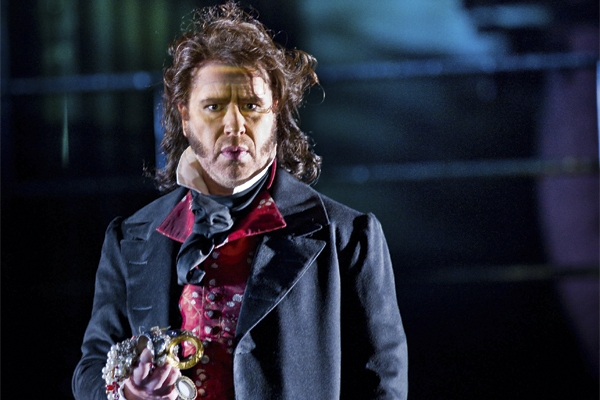The new production of Wagner’s first indisputable masterpiece The Flying Dutchman by English National Opera is a decided success, the best account of what contemporary producers make strangely heavy weather of that I have seen in decades. For some reason they find it hard to focus on the title role, and make it all a dream of Senta, or the Steersman. Jonathan Kent presents the Dutchman on Wagner’s terms, even though he can’t resist beginning the opera — and during the Overture, absurdly — with Senta as a small child being put to bed by her father Daland, and reading the story of the Dutchman, while projected mighty waves and a vast hulk loom excitingly. She hangs around for the rest of the Act, and then metamorphoses into the adult, vocal Senta in the form of Orla Boylan. It doesn’t do much harm, but it is redundant and slightly distracting.
The hero of the evening is conductor Edward Gardner. He launched into the Overture, when the lights were hardly down, with tremendous attack, on a level with the weather conditions in St Martin’s Lane. And he continued it with deliberate coarseness, strident brass, shrill woodwinds, thwacking drums and ferocious strings. He went on like that, too, emphasising both the elemental nature of the score, and the crudity of some of Wagner’s writing, a good idea; he even played the original ending of both the Overture and the whole opera, with none of the ‘redemption’ stuff which Wagner later infused into it. His tempi were on the fast side, so that the whole work took about two hours and ten minutes. Laudably, it played without an interval.
There’s no point in trying to claim that that is what Wagner really wanted, or didn’t, but all the most cogent accounts of Dutchman I’ve seen and heard have been like that. Thrilling as the orchestra was, the only trouble was that mainly the voices didn’t quite match up to it. None was disablingly inadequate, but only Boylan stood out for her passionate identification with Senta, and even her voice is no longer what it was a few years ago. This opera is the first of Wagner’s that is agreeably largely populated by obsessives, and James Cresswell, though looking good and sounding decent, lacked, in his delivery of the text, the elements of furious determination, bitterness, scorn and weariness that make him so attractive to Senta. He was more at ease in his scene with Daland, doing a venal deal. Oddly, Clive Bayley, a priori an ideal Daland, was too restrained and, more surprisingly, unsure in his lower notes. Some of the best singing came from Stuart Skelton, in what is usually regarded as the ungratefully wimpish role of Erik. His two scenes were touching, while the great central confrontation between the Dutchman and Senta was not.
The production, with plenty of individual touches, eschews any grand view of the work, in fact is just what a production, mostly, should be. The great battle of voices between the Norwegian sailors and the Dutchman’s crew, one of the score’s most arresting passages, is spoilt by having the latter prerecorded and coming through loudspeakers from the back of the auditorium.
The sheer idea of making an opera out of The Importance of Being Earnest strikes one as insane, which is presumably what appealed to Gerald Barry. The only previous opera of his I’ve seen is The Bitter Tears of Petra von Kant, at ENO, and I loathed it. It turns Fassbinder’s great tragic movie into an hysterical screaming match among a bunch of deranged women. At first I thought that Earnest was going to do the same, but with males as well, but it turned into a moderately amusing, madcap condensed version of the play. Paul Griffiths’s remark in the programme that it gives us ‘the impression of people caught on a merry-go-round, speedy and brilliantly painted, from which they yell out as they pass’ is precisely right. Everything flies past, which gives a completely different impression from the play, which certainly has a submerged ubiquitous hysteria, the point being that it is submerged.
What fares least well in the opera are the lethal one-liners, even those of Lady Bracknell, a bass role, in the Edith Evans tradition, sung by Alan Ewing. Music can do nothing with or for them. But exchanges, rows and social competitiveness thrive in Barry’s hands, and the brilliant cast was unfailing in energy and communicativeness. I’m not sure that it adds up to anything that one can take home and reflect on, but perhaps Barry would be horrified at the thought that it might.
The staggeringly brilliant Birmingham Contemporary Music Group, conducted with equal brilliance by Thomas Adès, played the explosive score with such aplomb that they almost distracted from the hellza-poppin’ proceeding in front of them.






Comments